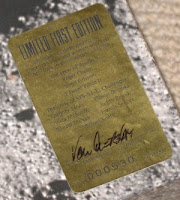I was given Moonshot The Game as a birthday present back in the late 1990s. It cropped up in conversation recently with a friend, but I couldn't find anything on the Internet to illustrate the conversation. So I decided to put up some information myself. And it is relevant to this blog in a manner of speaking. I later discovered that the game was renamed Tranquillity Base, and is available from History in Action Game at The Galactic Attic.
I have a limited edition of the game, signed by the its designer, Van Overbay. The box contains a board, four LM playing pieces, 28 NASA mission patches, and 180 cards of various types. The object of the game is to be the first to complete six missions - Mercury, Gemini or Apollo - and land on the Moon.
Thursday, 10 April 2008
Wednesday, 9 April 2008
Light This Candle, Neal Thompson
 Of all the Mercury Seven astronauts, Alan Bartlett Shepard Jr always struck me as the most interesting. And not simply because he was the first American into space. Nor because he was the only Mercury astronaut to walk on the Moon. Shepard seemed to have the most interesting personality, switching unpredictably from the "Icy Commander" to the joker who loved mimicking Bill Dana's hapless Hispanic astronaut, José Jimenez. After being diagnosed with Ménière's Disease and subsequently grounded, he hung in there at NASA until a new surgical technique allowed him to fly again. That suggests either a foolish optimism, a frighteningly grim level of determination, or an inhumanly stubborn inability to accept failure. The truth is probably a combination of all three, although heavily weighted in favour of the last.
Of all the Mercury Seven astronauts, Alan Bartlett Shepard Jr always struck me as the most interesting. And not simply because he was the first American into space. Nor because he was the only Mercury astronaut to walk on the Moon. Shepard seemed to have the most interesting personality, switching unpredictably from the "Icy Commander" to the joker who loved mimicking Bill Dana's hapless Hispanic astronaut, José Jimenez. After being diagnosed with Ménière's Disease and subsequently grounded, he hung in there at NASA until a new surgical technique allowed him to fly again. That suggests either a foolish optimism, a frighteningly grim level of determination, or an inhumanly stubborn inability to accept failure. The truth is probably a combination of all three, although heavily weighted in favour of the last.Admittedly, Shepard does not fare particularly well in Philip Kaufman's film of The Right Stuff
Light This Candle
Throughout the book, Shepard is repeatedly quoted as saying that his ambition was always "to be first". It characterised his time in the Navy - mastering a skill such as landing on a carrier at night at a much younger age than his contemporaries, for example. It was his driving need to be first that led Shepard to Project Mercury and, ultimately, put him in the capsule of Freedom 7 on May 5 1961. It's not that Shepard was the best at everything, as Thompson makes clear, but that he used every weapon in his considerable armoury to make sure he got what he wanted. He was known as a charmer, a ladies' man, a back-stabber, a consummate politician, fierce in training, and definitely at the top of his profession (as all the Mercury astronauts were). If he was not the best, he certainly made sure that those who counted thought he was. That's one aspect of the man that The Right Stuff
Shepard's ambition is clear in every incident recounted in Light This Candle
Happily, a new surgical technique corrected Shepard's Ménière's Disease, and he was returned to full flight status. He promptly politicked himself into command of Apollo 13. If Shepard had been unpopular before as the "Icy Commander" of the Astronaut Office, he was even less so after that. But he and his crew - Edgar Mitchell and Stuart Roosa - needed more time to train and so were bumped to Apollo 14. Did Shepard deserve an Apollo mission? He was the oldest of the Apollo astronauts, and had not flown at all during Gemini. In fact, his only flight had been a 15-minute sub-orbital hop. Thompson doesn't really get to grips with this question, although he does recount how Cooper was furious - especially since Shepard's Apollo career happened at Cooper's expense.
Thompson is a journalist and Light This Candle
Shepard was clearly a complex man, and probably not a very nice one. Thompson has written an honest biography of Alan Bartlett Shepard Jr. And of the few astronaut biographies I have read so far, Light This Candle
Light This Candle
Subscribe to:
Comments (Atom)



